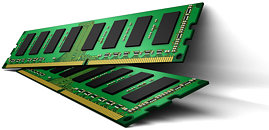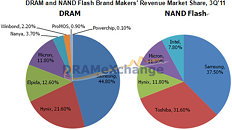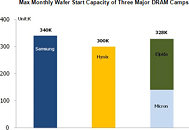qubit
Overclocked quantum bit
- Joined
- Dec 6, 2007
- Messages
- 17,865 (2.78/day)
- Location
- Quantum Well UK
| System Name | Quantumville™ |
|---|---|
| Processor | Intel Core i7-2700K @ 4GHz |
| Motherboard | Asus P8Z68-V PRO/GEN3 |
| Cooling | Noctua NH-D14 |
| Memory | 16GB (2 x 8GB Corsair Vengeance Black DDR3 PC3-12800 C9 1600MHz) |
| Video Card(s) | MSI RTX 2080 SUPER Gaming X Trio |
| Storage | Samsung 850 Pro 256GB | WD Black 4TB | WD Blue 6TB |
| Display(s) | ASUS ROG Strix XG27UQR (4K, 144Hz, G-SYNC compatible) | Asus MG28UQ (4K, 60Hz, FreeSync compatible) |
| Case | Cooler Master HAF 922 |
| Audio Device(s) | Creative Sound Blaster X-Fi Fatal1ty PCIe |
| Power Supply | Corsair AX1600i |
| Mouse | Microsoft Intellimouse Pro - Black Shadow |
| Keyboard | Yes |
| Software | Windows 10 Pro 64-bit |
The random access memory market is a fiercely competitive one. Also, the yearly high PC shipment volume cycles of yesteryear are now history, pushing the various memory manufacturers into the red - and staying there. Well, it seems like Elpida is feeling the pinch more than most, because much of their debt has come from the Japanese government's recapitalization program and must be repaid by the end of April 2012. It looks like they can't pay this off so easily and due to this pressing deadline are looking for cash wherever they can get it, so it looks like merging with one of their rivals such as Toshiba or Micron might help them out of this predicament. Ultimately though, everyone in the DRAM market is hurting now, so it looks like fewer players are needed, so that they can work more like an oligopoly to return to profitability.
While great for helping them to survive, this isn't such good news for the end customer, who will end up seeing higher prices for their memory and a much slower decline in prices, if any. There's lots of detailed analysis and facts and figures over at X-bit labs.



View at TechPowerUp Main Site
While great for helping them to survive, this isn't such good news for the end customer, who will end up seeing higher prices for their memory and a much slower decline in prices, if any. There's lots of detailed analysis and facts and figures over at X-bit labs.



View at TechPowerUp Main Site





 You may have the income to afford it but so many people don't. It's been nice to have at least ONE pc component be affordable.
You may have the income to afford it but so many people don't. It's been nice to have at least ONE pc component be affordable. 